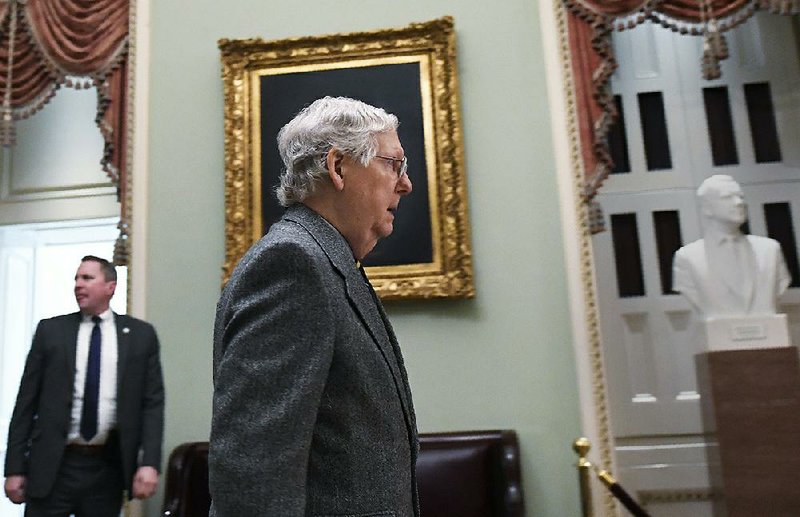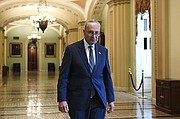WASHINGTON -- Senate leaders wrangled Friday over the terms of President Donald Trump's impeachment trial, deepening their impasse and throwing the start date for the trial further into doubt amid disputes over whether to call witnesses or introduce documentary evidence.
In a pair of barbed back-to-back speeches on the Senate floor, the top Republican and the top Democrat traded charges of hypocrisy and unfair dealing, settling nothing in the high-stakes fight over the shape of the constitutional proceeding that will decide Trump's fate.
The feuding on the first day of a new legislative session indicated that two weeks of holiday respite had done little to break a logjam. The impasse began in late December, after Speaker Nancy Pelosi said she would not send to the Senate two impeachment articles that were approved by the Democratic-led House until the Senate promised that the trial process would be fair.
"Their turn is over," Sen. Mitch McConnell, R-Ky., the majority leader, said Friday of House Democrats. "They have done enough damage. It is the Senate's turn now to render sober judgment as the framers envisioned."
Pelosi responded that McConnell's stance "made clear that he will feebly comply with President Trump's cover-up of his abuses of power and be an accomplice to that cover-up."
[Video not showing up above? Click here to watch » https://www.youtube.com/watch?v=LVV9qS-8a8s]
With no meeting between the Senate leaders scheduled, nor any indication of when Pelosi might send the articles, lawmakers and aides privately warned that the stalemate could stretch into mid-January, with Trump's presidency hanging in the balance.
McConnell, conceding that his chamber could not act without the House acting first, said Republicans would simply turn back to their regular legislative work while they wait, "content to continue the ordinary business of the Senate while House Democrats continue to flounder."
Stepping onto the Senate floor moments after McConnell, Sen. Charles Schumer of New York, the Democratic leader, accused the president's party of trying to steamroll to his acquittal.
"We are not asking for critics of the president to serve as witnesses in the trial," Schumer said. "We are asking only that the president's men, his top advisers, tell their side of the story. And Leader McConnell has been unable to make one argument -- one single argument -- as to why these witnesses and these documents should not be part of a trial."
After walking off the Senate floor, McConnell dismissed questions from reporters about whether he will meet with Schumer and when he expects the trial to start.
McConnell said he had already "addressed all of the relevant issues" in his floor remarks. He left the Capitol for the day without talking to Schumer about the timing or scope of a Senate trial of Trump. He has no plans to return until Monday.
The outcome of the dispute over witnesses and documents could determine not only when the trial begins and how long it lasts, but also whether it produces meaningful new information that could affect the outcome, either exonerating or further implicating Trump.
McConnell has argued that the Senate should wait to decide whether it needs to hear from witnesses until after opening statements from House managers and Trump's lawyers.
Schumer has called that "Alice-in-Wonderland logic."
Democrats have argued that in light of Trump's blanket defiance of the House's impeachment inquiry, the trial must include new evidence to be fair, and they want an upfront commitment to do that.
McConnell disagrees, though on Friday he did not rule out calling witnesses. He asked instead for the Senate to follow the precedent of the 1999 impeachment trial of President Bill Clinton, when lawmakers agreed unanimously to open the proceedings without an agreement on whether to call witnesses, and decided on that issue only after both sides presented opening arguments.
Schumer has asked that a trial include four witnesses and a wide array of documents that the White House blocked House investigators from accessing. His case has been aided in recent days as new evidence has surfaced in news reports and freedom of information lawsuits.
On Friday, as Schumer was addressing the Senate, a federal judge in New York ruled that Lev Parnas, an associate of Rudy Giuliani and involved in elements of the Ukraine scheme, could begin sharing additional documents and communications with the House.
"Each new revelation mounts additional pressure on the members of this chamber to seek the whole truth," Schumer said of the Senate.
Trump was impeached last month by the House on charges that he abused power and obstructed Congress in his dealings with Ukraine. Trump withheld nearly $400 million in military aid for Ukraine, an Eastern European ally that depends on U.S. support to counter Russia, after asking President Volodymyr Zelenskiy to publicly announce an investigation into Trump rival Joe Biden. The aid was ultimately released after Congress objected.
Democrats believe that their demands for witnesses are bolstered by new reports about Trump's decision to withhold the aid and unease among some GOP senators over the situation.
"The American people deserve the truth," Pelosi said in a statement. "Every Senator now faces a choice: to be loyal to the President or the Constitution."
Trump has made little secret of his eagerness for the Republican-controlled Senate to mount an elaborate trial that would not only dispense with the charges, but provide an opportunity for his allies to defend him, and Pelosi believes that withholding the impeachment charges could provide leverage in shaping the trial before it begins.
In his floor speech Friday, McConnell emphatically rejected that strategy. He denounced Democrats in both the House and Senate for degrading the impeachment process with what he called a historically weak case. Calling additional witnesses during a Senate trial, as Democrats have demanded, would not change that, he said.
"The same people who just spent weeks screaming that impeachment was so serious and so urgent that it couldn't wait for due process now decided it would wait indefinitely while they checked the political whims and looked for new talking points," McConnell said.
While Trump has repeatedly claimed that he was being denied due process rights in the House impeachment proceeding, the White House refused to participate when offered the opportunity.
McConnell defended himself against Democratic charges that he was unfairly prejudging the case and sought to turn the tables on Democrats, who he said were "openly coordinating political strategy with the speaker, who some might call the prosecution."
With McConnell firmly rooted in his position, Schumer appealed to moderate Republican senators to ensure the Senate has a "fair trial." If Democrats remain united, they need only four Republicans to temporarily join them to command a majority that's able to set the rules of the trial.
[Gallery not loading above? Click here for more photos » arkansasonline.com/14impeachment/]
"If we don't get a commitment upfront that the House managers will be able to call witnesses as part of their case, then the Senate will act as little more than a nationally televised meeting of the mock trial club," Schumer said.
The witnesses who Democrats want to see testify include John Bolton, Trump's former national security adviser; Mick Mulvaney, the acting White House chief of staff; Robert Blair, Mulvaney's senior adviser; and Michael Duffey, a White House budget aide.
Pelosi's office distributed "talking points" on the impeachment process to fellow Democrats on Friday.
"The House has fulfilled its constitutional duty and upheld our oath of office," the talking points say. "It's now up to the Senate to do their duty. The Senate has the constitutional obligation to hold a fair and honest trial ... and act as jurors."
The trial, according to Pelosi's office, must include witnesses and "pursuing evidence Trump has withheld."
"In coming weeks, Senate Republicans will be faced with a choice: Do they want to see a fair, bipartisan trial? Or do they want to set a precedent that allows the president free rein to do whatever he wants, including cheat our elections?" the talking points say.
Elsewhere, Trump is referred to as "a continuing threat to our democracy and danger to our national security."
Information for this article was contributed by Nicholas Fandos of The New York Times; by John Wagner, Michael Brice-Saddler, Rachael Bade, Robert Barnes, Paul Kane and Anne E. Marimow of The Washington Post; and by Lisa Mascaro of The Associated Press.
A Section on 01/04/2020


